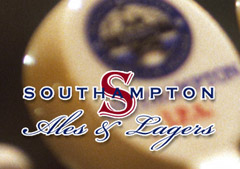Prepare your knee.
Pabst Brewing announces that it has entered into a strategic alliance with Southampton Bottling to market and distribute its award-winning line of craft-brewed ales and lagers.
Jerk.
Oh my God, what are they doing? Selling out.
Those last words are from Southampton brewmaster Phil Markowski, saying out loud what he knows many in the beer loving community are thinking.
 Let’s cut to the chase. Markowski is one of the most respected brewers in the country and many of the beers he’s brewed at Southampton Publick House in Long Island developed a cult following. They are beers of conviction (my words, not his).
Let’s cut to the chase. Markowski is one of the most respected brewers in the country and many of the beers he’s brewed at Southampton Publick House in Long Island developed a cult following. They are beers of conviction (my words, not his).
Whether you figure Pabst abandoned conviction in the 1870s by joining the rush to adjunct brewing, in 2001 when it closed its last brewery and became a marketing firm, or sometime between I’m comfortable saying that Pabst currently doesn’t sell many, perhaps any, beers of conviction. That changes when this deal closes during the first quarter of 2008.
To be clear, I’m not calling the myriad of brands (remember we’re talking about Pabst, Schlitz, Lone Star and a host of others) Pabst markets bad beers. They are well executed, which is why Pabst was honored as Large Brewing Company of the Year at the Great American Beer Festival in 2006 and 2007. Remember that what they choose to do they do well.
So what’s going to happen with the Southampton beers? Markowski discussed the future Friday while his car was on a ferry, taking him to his Connecticut home after he’d finished a day of brewing at the Publick House in Southampton. He lives pretty much equidistant, meaning 2½ hours, from the three breweries where he makes Southampton beers.
At Olde Saratoga Brewing in Saratoga Spring, N.Y., he supervises production of three year-round brands sold in six packs, as well as seasonal beers sold in 22-ounce bottles. At Sly Fox Brewing in Royersford, Pa., he brews beers packaged in 750ml corked bottles. And in Southampton he brews beer for the pub, with a part of a few batches sometimes ending up in bottles.
What changes? He won’t brew at Olde Saratoga anymore, because the brewery doesn’t have enough excess capacity. He’ll likely make Secret Ale, Double White Ale and perhaps IPA at the Lion Brewery in Pennsylvania, which is in the process of being sold. (Lew Bryson is the go-to guy for those updates). Nothing changes at the pub or with the 750s.
 “I intend to be on site for every brew indefinitely,” Markowski said.
“I intend to be on site for every brew indefinitely,” Markowski said.
“I have the intention of being totally hands on,” he said a little later. “There is no thought of changing the product or the integrity of the product.”
Those are words of conviction. He speaks just as assertively when it comes to contract brewing and batch size.
Arguments about contract brewing have been going on for more than 20 years. “I understand the roots of that (“contract isn’t the same as craft”) thinking, but I think that is changing,” Markowski said. “As the industry is growing up some of subjectivity is coming out of it. … It’s more, ‘How does it taste?'”
Remember the off-the-wall commercials that Miller ran 10 years ago featuring a fellow called Dick? One for Miller Genuine Draft told us, “It’s time to drink beer from vats the size of Rhode Island.” That pretty well epitomized a notion of micro versus macro that continues today.
“It’s less romantic, but the perception that you can’t make good beer on a large scale is wrong,” Markowski said. Then why aren’t the larger breweries winning medals in the GABF categories micros enter?
“They often become timid with a beer flavor profile,” Markowski said.
So here we are back discussing conviction. When the this deal was announced last week, Long Island wine blogger Lenn Thompson wrote:
… how many times have we seen terrific craft brews gobbled up by big brewers only to see the distinctive flavors disappear, resulting in watered down beers that are mere shadows of their former selves? I’m worried, but I guess we’ll see how this plays out.
Other than the Celis Brewery, which Miller literally ran into the ground, can you think of another small American brewery ruined when it was gobbled up? (And, to be clear, Southampton is not being gobbled.)
I may have forgotten one, but I can guarantee the list of smaller breweries that ran aground by underestimating beer drinkers’ interest in distinctive flavors is far longer.
It’s hard to overstate the importance of conviction.
If the conviction is there, and I have no doubt Phil is being extremely sincere when he says that, then a deal like this is really a boon for beer enthusiasts.
It affords more people to opportunity enjoy his product across the country (and maybe globe.)
Hi Stan. What about Redhook? Not to say they’re making dumb-downed beer. But in the years since their alliance with A-B, they’ve lost their edge in my opinion.
Bill – I wonder if Redhook has changed or is it Redhook beers’ place on the flavor spectrum?
So they might have lost what you perceive as an edge simply by staying the same. Quite honestly, I’ve never been enough of a Redhook drinker to chart that.
Good clarification on the SPH-Pabst deal since apparently people think they sold out, indeed. Which wasn’t apparent anyway…but it was inferred.
How is this “deal” that much different from what Victory, Rogue and others are already doing with large distro networks? Nothing. It just appeared to be different.
Question though…does the Lion Brewery date their bottles? Would be nice to see all SPH bottles carry some sort of dating system.
“So they might have lost what you perceive as an edge simply by staying the same.”
I recently revisited Redhook ESB after a long hiatus and would tend to agree with you Stan, I really like the smooth maltiness of this beer with the right amount of hop balance to style.
However, many have pointed out that it has mellowed in its diacetyl character — whether you find that a good or bad thing, I doubt it’s any “dumbing down” or A-B hand in the mix – probably just listening to a majority of drinkers who don’t like or understand the flavor.
I haven’t seen much hurt to the better beers in these “alliances,” at least not here in the U.S. Don’t get started on InBev’s spread of its reign.
Steve – When a first typed the sentence I wrote “another small brewery” and changed it to “another small American brewery.”
I guess you know why.
You know…I’d just like to say first, something that’s pissed me off for many a year, and resurfaced when I saw Phil with them medals…Southampton’s been robbed on being Brewpub (of some damned size) of the year at GABF. Yeah, I know, the medals, the points, but by golly, like you said, Phil’s one of THE brewers, and…well, ’nuff said.
Following that, The Lion’s going to do a great job on Phil’s beers. They’re competent, eager, and the former owners left them in great shape to handle stuff like this. I’m actually looking forward to Phil’s beers bringing home as many GABF medals to PA as Pabst did when they brewed outside of Allentown (including the most medals ever won by one brewery in one year at GABF, BTW).
And…anyone who sez Phil’s beers will go downhill or get dumb after this distribution agreement? You and me, outside, right now.
“Selling out” implies that the brewer’s product will be compromised. It doesn’t sound like this brewer is selling out at all. It sounds like a talented person who’s being appropriately rewarded.